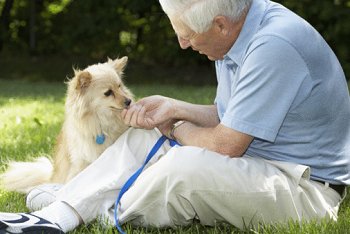Adopting a Dog From Dog Breed Rescue
By Michele Welton, Dog Trainer, Breed Selection Consultant, Author of 15 Dog Books

This gentleman is evaluating the temperament of a little dog offered by a rescue group. Hopefully they're well-matched and the little dog will find her Forever Home!
Unlike animal shelters and humane societies, dog rescue groups don't have a central or public location where you can go see a selection of dogs whenever you feel like it.
Instead, a dog rescue group is a small group of dedicated dog lovers who maintain a network of temporary foster homes.
When a dog is turned over to a rescue group, he's placed into a foster home for an evaluation period. The foster family provides daily care and basic training while the rescue group searches for the right permanent home – which could be you.
Some dog rescue groups specialize in one breed (like Pug Rescue of Sacramento). Others accept several related breeds (Northeast All-Retriever Rescue). Still others accept all breeds, crosses, and mixes.
Advantages of dog rescue groups over animal shelters
- A rescue dog, as opposed to an animal shelter dog, has been evaluated in a home setting. The foster family can tell you about the dog's habits and behaviors. They know if he's housebroken, if he barks a lot, if he likes children, if he gets along with other dogs and cats.
- A rescue dog has usually received some housebreaking, socialization, and training from the foster family.
- A rescue dog will always be spayed or neutered and has had any health problems treated (or at least diagnosed and treatment begun).
Disadvantages of dog breed rescue groups
- As with dogs from animal shelters, dogs from rescue groups usually have an unknown background, which means you can't be sure what kinds of problematic genes may be lurking. Many inherited health problems don't arise until adulthood or middle age. This is especially a concern in purebred dogs (see The Truth About Purebred Dogs).
- As with dogs from animal shelters, some dogs from rescue groups have behavioral issues that need some work.
- The vast majority of dogs offered by rescue groups are adolescents or adults. If you have your heart set on a puppy, a rescue group is less likely to be a good source for you.
- If you're looking for an uncommon breed, you're less likely to find one through a rescue group.
- Even with a popular breed, don't expect a whole catalog of choices. For example, you can't call a Dachshund rescue group and order a miniature longhaired reddish-brown 8-month-old female who loves cats. A rescue group will have whatever dogs they have at the time, and if they think you might be a good match for a specific dog, that's the one you will get to consider.
- It's usually more expensive to adopt a dog from a rescue group than from an animal shelter or humane society. But keep in mind that the rescue group has neutered the dog, treated any health problems, started a flea and heartworm preventative program, provided grooming, and invested one-on-one time and effort in basic training and socialization. Rescue groups do NOT make money – indeed, their adoption fees often don't cover their costs.
- It can be difficult to adopt a dog from a rescue group. Most groups are very careful with their dogs. Their adoption requirements are often strict. There may be a waiting list. You will need to work your way through a lengthy process that includes an application, references, interviews, and a home inspection. If you find this degree of screening too intrusive, you might not want to pursue the rescue option.
My best-selling books – now available FREE on my website
 Respect Training For Puppies: 30 seconds to a calm, polite, well-behaved puppy is for puppies 2 to 18 months old. Your puppy will learn the 21 skills that all family dogs need to know. Click here to read for free.
Respect Training For Puppies: 30 seconds to a calm, polite, well-behaved puppy is for puppies 2 to 18 months old. Your puppy will learn the 21 skills that all family dogs need to know. Click here to read for free. Teach Your Dog 100 English Words is a unique Vocabulary and Respect Training Program that will teach your adult dog to listen to you and do what you say. Click here to read for free.
Teach Your Dog 100 English Words is a unique Vocabulary and Respect Training Program that will teach your adult dog to listen to you and do what you say. Click here to read for free. 11 Things You Must Do Right To Keep Your Dog Healthy and Happy helps your dog live a longer, healthier life. Get my honest advice about all 11 Things before you bring home your new puppy, because some mistakes with early health care cannot be undone. Click here to read for free.
11 Things You Must Do Right To Keep Your Dog Healthy and Happy helps your dog live a longer, healthier life. Get my honest advice about all 11 Things before you bring home your new puppy, because some mistakes with early health care cannot be undone. Click here to read for free.
